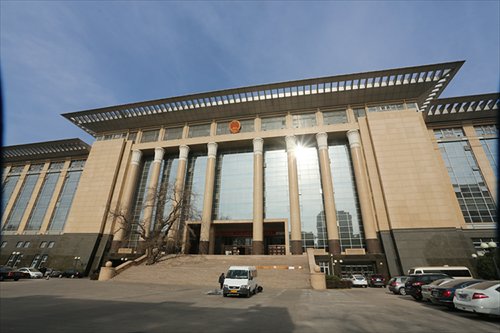
The Supreme People's Court in Beijing Photo: IC
China's supreme court on Thursday unveiled plans to toughen proceedings of the country's competition legislation over the course of the 14th Five-Year Plan period (2021-25), crystallizing a more effective regulatory framework for the platform-based economy.
Relevant judicial interpretations would be formulated at an opportune time to unequivocally rein in varied monopolistic and anti-competitive behavior, eliminate market blockages and boost fair competition, according to an intellectual property judicial protection plan for the five-year period published by the Supreme People's Court (SPC).
The supreme court pledges to properly handle monopolistic disputes in the internet sphere, improve antitrust judging rules for the platform economy, prevent the unchecked expansion of capital, and push for the regulated, healthy and sustainable development of online platforms.
Also on Thursday, the country's market regulatory authorities held an antitrust work conference in Kunming, Southwest China's Yunnan Province.
Describing 2020 as an iconic year for the country's antitrust push, the State Administration for Market Regulation (SAMR) revealed in a statement after the meeting that it closed 109 monopoly cases throughout the past year with penalties totaling 450 million yuan ($69.33 million).
In a high-profile move, the top market regulator slapped a record $2.8 billion antitrust fine on e-commerce giant Alibaba earlier in April.
The SAMR vowed to strengthen antitrust regulatory enforcement and improve its antitrust oversight capacities in the Thursday statement.
The judicial and regulatory toughening that envisions unified judging criteria is considered to put small firms on an equal footing with their bigger counterparts and push for the economy's rebalancing to be innovated-oriented, experts said.
Judicial interpretations concerning the country's antitrust and anti-unfair competition legislation are indispensable to plug loopholes in current laws against notably unfair competitive behavior and abuses of monopoly privileges that could result in depriving or restricting free and fair competition in the platform economy, Liu Junhai, director of the Institute of Business Law at Renmin University of China, told the Global Times on Thursday.
He cited the commonplace practice of burning cash that will quickly increase a platform's user base, thus driving out its rivals before rendering the platform a dominant player that eventually dictate price hikes to its advantage.
China's Anti-Monopoly Law came into force in 2008 while the Anti-Unfair Competition Law, enacted in late 1993, was amended for the second time in 2019.
There are two types of litigation invoking the two laws - civil cases such as ByteDance's lawsuit against Tencent over monopoly practices, which has been withdrawn, and administrative cases in which some companies appeal against penalties imposed by market regulators, according to Liu, also a special consultant for the SPC.
Relevant judicial interpretations ought to be issued to clarify whether the burden of proof lies with the plaintiff or the defendant, he continued, reckoning the would-be interpretations will facilitate plaintiffs to undertake litigation, enable judges to decide on cases, and empower legal enforcements of court rulings.
An improvement of the legal framework would augur well for market competition as it provides a safety net for small start-ups and ensures the survival of the most innovative businesses, the expert said, adding that it would protect consumers in that the availability of wider-ranging platforms allows buyers to truly use their discretion in choosing from multiple competing platforms.
